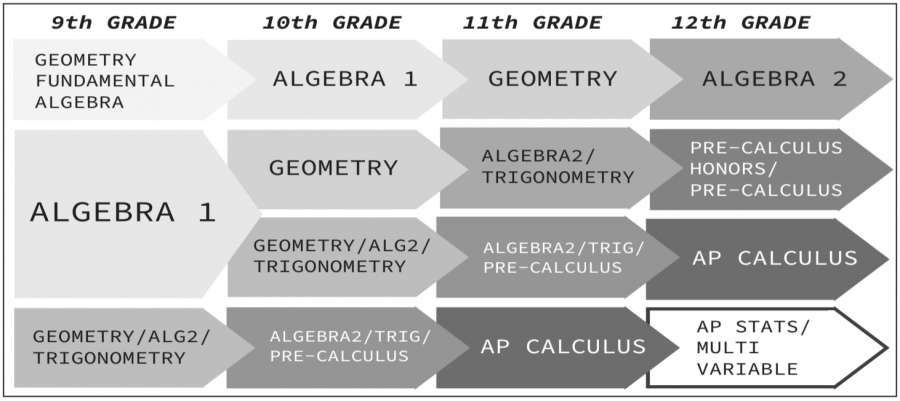Irvington’s Common Core Math Classes Continue to Improve
November 15, 2018
Irvington is in its third year of Common Core, a state-wide math curriculum that, at IHS, has seen widespread backlash from students and parents alike. Despite the general opinion that the Irvington math curriculum negatively impacts students and systematically disadvantages those in the non-accelerated pathway, the program has undergone significant changes in the past year that have improved class mobility and curriculum effectiveness.
Perhaps the issue that Irvington and FUSD get the most criticism for is their perceived inflexibility and inability to provide the right math classes and pace to students—at least compared to the state average. But for most students, that simply isn’t true. In fact, most California schools seem to offer the “regular” (taking Precalculus in senior year) and “accelerated” pathways that the state of California recommends. But Irvington offers an extra option in which students complete calculus by the end of junior year. Not only does Irvington keep on par with California’s median math curricula, they have alternatives for the majority of Irvington students that wish to excel beyond the standard—classes that, logically, should yield a happier student body.
Despite already offering accelerated math pathway, Irvington created another alternative to the accelerated pathway, Double Block, which was first made available to the Class of 2021. Double Block gives excelling students the option to take an Algebra 2/Trigonometry elective alongside Geometry in their sophomore year. Students with an A in both semesters of Algebra 1 and a score of at least an 90 percent on all three freshman-year district benchmarks are eligible for this opportunity, which is fair, logical, and beneficial to students. Rather than taking Irvington’s original accelerated track and compacting two separate math levels into a single, fast-paced year, students can learn these topics with more depth and time. This also ensures that students who opted out of or missed the chance to take the accelerated pathway still have the option of taking Calculus by senior year.
While taking two math courses simultaneously is arguably stressful, it is completely feasible as they are separate branches of mathematics, so it would be easy to learn them side by side. The concepts learned in Geometry and Algebra 2/Trigonometry do overlap, but the majority of topics covered in the Algebra 2/Trigonometry are not necessarily needed to learn the Geometry.
“If you compartmentalize it, Geometry is another subject altogether from Alg. 2/Trig, so learning them at the same time does not interfere with learning both subjects,” said Pragnya Vijayan (10), one of the sophomores enrolled in Double Block.
Although this compels students to abandon an elective, they have plenty of options: they can still forgo PE for that year and take it senior year, take zero period PE in their sophomore year, or postpone meeting their art credit. The only group unable to take advantage of Double Block are students in marching band, but considering that Common Core Math at Irvington is only in its third year, the amount of progress Irvington has made to adjust to student responses has been commendable.
Irvington has even introduced Geometry and Fundamental Algebra (or GFA), a class for students who struggle in math that offers the standard eighth grade course in a high school setting. In fact, Irvington has not only offered two different curriculums accelerating California’s standard pathway, it has also provided students with the option to take lower level classes if they struggle with math as a subject.
Despite these additions to the math curriculum, all the changes seem overshadowed by the complaints and grievances of students. As a newly-implemented curriculum, Common Core was bound to create “guinea pig” years of students who were subject to an arduous transition period. Unfortunately, this affects all Irvington students, with the exception of the graduating class.
But most students who oppose Irvington’s math curriculum are actually against the discrepancy between teachers who teach regular math classes and teachers who teach accelerated or double-accelerated math classes.
“One of the big issues around here is that there are certain teachers that students don’t want,” Ms. Bennett, counselor, said. “This year, I’ve had more complaints where it’s not the class level or difficulty, but students’ issue with the teacher teaching it.”
While the discrepancy in difficulty between teachers can be unfair, it is not the fault of Irvington’s math program itself. Placing the blame on the curriculum, while significantly easier, is misleading and perpetuates the narrative that Irvington cares little for its students and does even less to accommodate them and their needs.
Overall, Irvington has strivend to ameliorate its math programs since first implementing the Common Core curriculum. True, the transition period may have harmed the students and teachers involved in the process. However, but based on how much has been accomplished, if given more time for adjustment, continual improvement can be expected.

